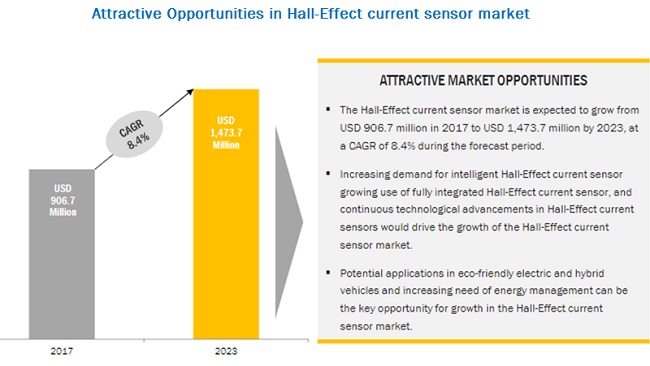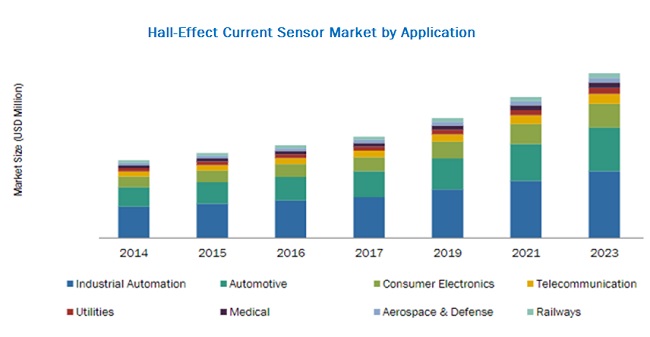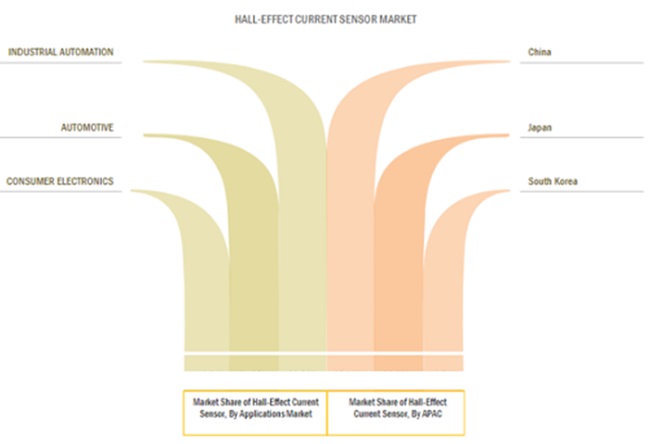Hall-Effect Current Sensor Market by Type, Technology, Output (Linear and Threshold), Industry (Industrial Automation, Automotive, Consumer Electronics, Telecommunication, Utilities, Medical, Railways), and Region - Global Forecast to 2023
The Hall-Effect current sensor market is expected to grow from USD 831.0 Million in 2016 to USD 1,473.7 million by 2023, at a CAGR of 8.4% from 2017 to 2023. Continuous technological advancements, growing use of fully integrated programmable current sensors, advantage of galvanic isolation-based Hall-Effect current sensors, and growing demand for intelligent Hall-Effect current sensors are expected to drive the growth of the Hall-Effect current sensor market in the coming years.

The Hall-Effect current sensor market typically comprises the products provided by original equipment manufacturers (OEMs) and third-party vendors for industrial automation, consumer electronics, automotive, telecommunication, utilities, medical, aerospace & defense, and railways industries. Hall-Effect current sensors are mainly used for current monitoring, overcurrent fault detection, and power measurement in these industries.
Currently, industry players are manufacturing fully integrated and programmable current sensors based on BiCMOS or CMOS technology. These current sensors have features such as no insertion loss, low power consumption, compact package size, single or dual power supply, higher accuracy and sensitivity, galvanic isolation, and faster response time.

Market Dynamics
Drivers: Continuous technological advancements in Hall-Effect current sensors
Hall-Effect current sensors are now manufactured using BiCMOS technology, a combination of bipolar junction transistor and complementary metal-oxide semiconductor. BiCMOS offers a high current drive per unit, low input density, high power dissipation, and low noise compared to conventional or CMOS technology. This technology is highly reliable and simple and is compatible with 0.8-μm CMOS technology. The BiCMOS technology has improved the performance of Hall-Effect current sensors.
Restraints: Inconsistency in the strength of magnetic fields
Sensors produce an output voltage directly proportional to the strength of the magnetic field generated by the current flowing through the shunt. As most sensors operate from a single 5-Vdc supply, their output does not need level shifting before it is connected to an analog to digital (A/D) converter, microprocessor, or microcontroller. Hall-Effect current sensors are not suitable for measuring the flow of current if the distance between the generated magnetic field and the current-carrying conductor is more than 10 cm. Hall-Effect sensors work on the concept of magnetic field, which makes them more vulnerable to external magnetic fields, leading to bias or inconsistent measurement of the current flow.
Opportunities: Potential applications in eco-friendly electric and hybrid vehicles
The automotive marketplace is shifting from mechanical actuation and timing methods to electrically driven systems. The increasing demand for gas, rise in prices, and environmental concerns are driving the market for eco-friendly and hybrid vehicles. Hall-Effect current sensors are used in converters, inverters, and battery management units of HEVs and EVs. Therefore, the expected growth of the HEV and EV market will have a positive impact on the Hall-Effect current sensor market in the coming years.
Challenges: Demand for low-cost Hall-Effect current sensors
The consumers of Hall-Effect current sensors are the key players in the segments such as automotive, consumer electronics, medical, industrial automation, railways, and aerospace & defense. The major demand for Hall-Effect-based current sensors has been witnessed from the automotive and consumer electronics industry. While both these industries are growing rapidly, they face a stiff price competition in the market. Therefore, the players in these industries demand low-cost Hall-Effect current sensors to bring down the price of the final product.
Hall-Effect Current Sensor Market in APAC, By Application and Country

Report Scope Table
|
Report Metric |
Details |
|
Report Name |
Hall-Effect current sensor Market |
|
Base year |
2016 |
|
Forecast period |
2017-2023 |
|
Units |
Value (USD) |
|
Segments covered |
Type, Technology, Output, End-Use Industry & Geography |
|
Geographic regions covered |
North America, APAC, Europe and RoW |
|
Companies covered |
ABB Ltd (Switzerland), Honeywell International, Inc. (US), STMicroelectronics N.V. (Switzerland), Allegro Microsystems LLC (US), Asahi Kasei Microdevice Corporation (Japan), Infineon Technologies AG (Germany), Melexis NV (Belgium), LEM Holding SA (Switzerland), TDK Corporation (Japan), and Kohshin Electric Corporation (Japan) |
By Output
- Linear
- Threshold
By Technology:
- BiCMOS
- CMOS
By Type:
- Open-Loop Current Sensor
- Closed-Loop Current Sensor
By End-Use Industry:
- Industrial Automation
- Automotive
- Consumer Electronics
- Telecommunication
- Utilities
- Medical
- Railways
- Aerospace & Defense
By Geography:
- North America
- Europe
- Asia Pacific (APAC)
- Rest of the World (RoW)
Major/Key Players are ABB Ltd (Switzerland), Honeywell International, Inc. (US), STMicroelectronics N.V. (Switzerland), Allegro Microsystems LLC (US), Asahi Kasei Microdevice Corporation (Japan), Infineon Technologies AG (Germany), Melexis NV (Belgium), LEM Holding SA (Switzerland), TDK Corporation (Japan), and Kohshin Electric Corporation (Japan).
Recent Developments
- LEM (US) introduced digital output versions of HO and HLSR open-loop Hall-Effect current transducers with analog to digital (A/D) conversion. It operates using an onboard sigma-delta modulator and gives a 1-bit serial bit stream output. The new transducers can use a supply voltage of 3.3 V or 5 V, and the operating temperature range is from −40°C to +105°C.
- Allegro (US) introduced a new optimized Hall-Effect integrated circuit (IC) ATS699 and rare earth pellet combination that provides a user-friendly solution for direction, detection, and true zero-speed digital gear-tooth sensing. This new IC employs patented algorithms for the special operational requirements of automotive transmission and recreational vehicle applications. It is also compatible with non-automotive applications such as white goods, gymming equipment, and industrial equipment.
- Asahi Kasei Microdevice Corporation (Japan) introduced the CQ-330x open-loop current sensor that has high isolation voltage and is useful for consumer inverters, servo motor controllers, UPS, and photovoltaic power generation.
To speak to our analyst for a discussion on the above findings, click Speak to Analyst

Table of Contents
1 Introduction (Page No. - 13)
1.1 Objectives of the Study
1.2 Definition
1.3 Study Scope
1.3.1 Markets Covered
1.3.2 Geographic Scope
1.3.3 Years Considered for the Study
1.4 Currency
1.5 Package Size
1.6 Limitations
1.7 Market Stakeholders
2 Research Methodology (Page No. - 17)
2.1 Research Data
2.1.1 Secondary Data
2.1.1.1 Key Data From Secondary Sources
2.1.2 Primary Data
2.1.2.1 Key Data From Primary Sources
2.1.2.2 Key Industry Insights
2.1.2.3 Breakdown of Primaries
2.2 Market Size Estimation
2.2.1 Bottom-Up Approach
2.2.2 Top-Down Approach
2.3 Market Breakdown and Data Triangulation
2.4 Research Assumptions
3 Executive Summary (Page No. - 26)
4 Premium Insights (Page No. - 31)
4.1 Attractive Growth Opportunities in the Hall-Effect Current Sensor Market
4.2 Market, By Type
4.3 Market in APAC, By Application and Country
4.4 Market, By Application
4.5 Market, By Geography
5 Market Overview (Page No. - 35)
5.1 Introduction
5.1.1 Drivers
5.1.1.1 Continuous Technological Advancements in Hall-Effect Current Sensors
5.1.1.2 Growing Use of Fully Integrated and Programmable Current Sensors
5.1.1.3 Advantage of Galvanic Isolation-Based Hall-Effect Current Sensors
5.1.1.4 Growing Demand for Intelligent Hall-Effect Sensors
5.1.2 Restraints
5.1.2.1 Inconsistency in the Strength of Magnetic Fields
5.1.3 Opportunities
5.1.3.1 Potential Applications in Eco-Friendly Electric and Hybrid Vehicles
5.1.3.2 Increasing Need for Energy Measurement Owing to Urbanization and Industrialization
5.1.4 Challenges
5.1.4.1 Demand for Low-Cost Hall-Effect Current Sensors
6 Hall-Effect Current Sensor Market, By Type (Page No. - 41)
6.1 Introduction
6.2 Open-Loop Hall-Effect Current Sensor
6.3 Closed-Loop Hall-Effect Current Sensor
7 Market, By Technology (Page No. - 46)
7.1 Introduction
7.2 BiCMOS
7.3 CMOS
8 Hall-Effect Current Sensor Market, By Output (Page No. - 50)
8.1 Introduction
8.2 Linear (Analog) Hall-Effect Current Sensor
8.3 Threshold (Digital) Hall-Effect Current Sensor
9 Market, By End-Use Industry (Page No. - 54)
9.1 Introduction
9.2 Automotive
9.3 Industrial Automation
9.4 Consumer Electronics
9.5 Medical
9.6 Utilities
9.7 Railway
9.8 Telecommunication
9.9 Aerospace & Defense
10 Geographic Analysis (Page No. - 63)
10.1 Introduction
10.2 Asia Pacific
10.2.1 China
10.2.2 India
10.2.3 Japan
10.2.4 South Korea
10.2.5 Rest of APAC
10.3 North America
10.3.1 US
10.3.2 Canada
10.3.3 Mexico
10.4 Europe
10.4.1 UK
10.4.2 France
10.4.3 Germany
10.4.4 Italy
10.4.5 Rest of Europe
10.5 RoW
10.5.1 Middle East
10.5.2 Africa
10.5.3 South America
11 Competitive Landscape (Page No. - 95)
11.1 Introduction
11.2 Market Share Analysis
11.3 Competitive Scenario
11.3.1 Product Developments
11.3.2 Agreements, Collaborations, and Partnerships
11.3.3 Mergers and Acquisitions
12 Company Profiles (Page No. - 102)
(Business Overview, Strength of Product Portfolio, Business Strategy Excellence, Recent Developments, Key Relationships)*
12.1 Introduction
12.2 ABB Ltd
12.3 Allegro MicroSystems, LLC. (Sanken Electric Co., Ltd.)
12.4 Asahi Kasei Microdevices Corporation
12.5 Infineon Technologies AG
12.6 Honeywell International Inc.
12.7 Stmicroelectronics N.V.
12.8 LEM Holding SA
12.9 KOHSHIN ELECTRIC CORPORATION
12.10 Melexis NV
12.11 TDK Corporation
12.12 Key Innovators
12.12.1 Vacuumschmelze GmbH & Co. KG
12.12.2 American Aerospace Controls
12.12.3 Electrohms Pvt Ltd
12.12.4 Magnesensor Technology (MST)
12.12.5 Pulse Electronics Corporation
*Details on Business Overview, Strength of Product Portfolio, Business Strategy Excellence, Recent Developments, Key Relationships Might Not Be Captured in Case of Unlisted Companies.
13 Appendix (Page No. - 137)
13.1 Insights of Industry Experts
13.2 Discussion Guide
13.3 Knowledge Store: Marketsandmarkets Subscription Portal
13.4 Introducing RT: Real-Time Market Intelligence
13.5 Available Customizations
13.6 Related Reports
13.7 Author Details
List of Tables (69 Tables)
Table 1 Comparison of Various Current Sensing Techniques
Table 2 Hall-Effect Current Sensor Manufacturer, By Type
Table 3 Hall-Effect Current Sensor Market, By Type, 20142023 (USD Million)
Table 4 Open-Loop vs Closed-Loop Hall-Effect Current Sensor
Table 5 Open-Loop Market, By End-Use Industry, 20142023 (USD Million)
Table 6 Closed-Loop Market, By Industry, 20142023 (USD Million)
Table 7 Market, By Technology, 20142023 (USD Million)
Table 8 Market for BiCMOS Technology, By Type, 20142023 (USD Million)
Table 9 Market for CMOS Technology, By Type, 20142023 (USD Million)
Table 10 Hall-Effect Current Sensor Market, By Output, 20142023 (USD Million)
Table 11 Hall-Effect Current Sensor Shipments, By Output, 20142023 (Million Units)
Table 12 Market, By Industry, 20142023 (USD Million)
Table 13 Market for Automotive, By Region, 20142023 (USD Million)
Table 14 Market for Industrial Automation, By Region, 20142023 (USD Million)
Table 15 Market for Consumer Electronics, By Region, 20142023 (USD Million)
Table 16 Hall-Effect Current Sensor Market for Medical, By Region, 20142023 (USD Million)
Table 17 Market for Utilities, By Region, 20142023 (USD Million)
Table 18 Market for Railway, By Region, 20142023 (USD Million)
Table 19 Market for Telecommunication, By Region, 20142023 (USD Million)
Table 20 Market for Aerospace & Defense, By Region, 20142023 (USD Million)
Table 21 Market, By Region, 20142023 (USD Million)
Table 22 Market for BiCMOS Technology in APAC, By Industry, 20142023 (USD Million)
Table 23 Hall-Effect Current Sensor Market for CMOS Technology in APAC, By Industry, 20142023 (USD Million)
Table 24 Market in APAC, By Country, 20142023 (USD Million)
Table 25 Market in China, By Industry, 20142023 (USD Million)
Table 26 Market in China, By Technology, 20142023 (USD Million)
Table 27 Market in India, By Industry, 20142023 (USD Million)
Table 28 Market in India, By Technology, 20142023 (USD Million)
Table 29 Market in Japan, By Industry, 20142023 (USD Million)
Table 30 Hall-Effect Current Sensor Market in Japan, By Technology, 20142023 (USD Million)
Table 31 Market in South Korea, By Industry, 20142023 (USD Million)
Table 32 Market in South Korea, By Technology, 20142023 (USD Million)
Table 33 Market in Rest of APAC, By Industry, 20142023 (USD Million)
Table 34 Market in Rest of APAC, By Technology, 20142023 (USD Million)
Table 35 Market for BiCMOS Technology in North America, By Industry, 20142023 (USD Million)
Table 36 Market for CMOS Technology in North America, By Industry, 20142023 (USD Million)
Table 37 Hall-Effect Current Sensor Market in North America, By Country, 20142023 (USD Million)
Table 38 Market in US, By Industry, 20142023 (USD Million)
Table 39 Market in US, By Technology, 20142023 (USD Million)
Table 40 Market in Canada, By Industry, 20142023 (USD Million)
Table 41 Market in Canada, By Technology, 20142023 (USD Million)
Table 42 Market in Mexico, By Industry, 20142023 (USD Million)
Table 43 Hall-Effect Current Sensor Market in Mexico, By Technology, 20142023 (USD Million)
Table 44 Market for BiCMOS Technology in Europe, By Industry, 20142023 (USD Million)
Table 45 Market for CMOS Technology in Europe, By Industry, 20142023 (USD Million)
Table 46 Market in Europe, By Country, 20142023 (USD Million)
Table 47 Market in UK, By Industry, 20142023 (USD Million)
Table 48 Market in UK, By Technology, 20142023 (USD Million)
Table 49 Market in France, By Industry, 20142023 (USD Million)
Table 50 Hall-Effect Current Sensor Market in France, By Technology, 20142023 (USD Million)
Table 51 Market in Germany, By Industry, 20142023 (USD Million)
Table 52 Market in Germany, By Technology, 20142023 (USD Million)
Table 53 Market in Italy, By Industry, 20142023 (USD Million)
Table 54 Market in Italy, By Technology, 20142023 (USD Million)
Table 55 Market in Rest of Europe, By Industry, 20142023 (USD Million)
Table 56 Market in Rest of Europe, By Technology, 20142023 (USD Million)
Table 57 Market for BiCMOS Technology in RoW, By Industry, 20142023 (USD Million)
Table 58 Market for CMOS Technology in RoW, By Industry, 20142023 (USD Million)
Table 59 Hall-Effect Current Sensor Market in RoW, By Region, 20142023 (USD Million)
Table 60 Market in Middle East, By Industry, 20142023 (USD Million)
Table 61 Market in Africa, By Industry, 20142023 (USD Million)
Table 62 Market in Africa, By Technology, 20142023 (USD Million)
Table 63 Market in Middle East, By Technology, 20142023 (USD Million)
Table 64 Market in South America, By Technology, 20142023 (USD Million)
Table 65 Market in South America, By Industry, 20142023 (USD Million)
Table 66 Hall-Effect Current Sensor Market in South America, By Technology, 20142023 (USD Million)
Table 67 Product Launches
Table 68 Agreements, Collaborations, and Partnerships
Table 69 Mergers and Acquisitions
List of Figures (46 Figures)
Figure 1 Hall-Effect Current Sensor Market Segmentation
Figure 2 Market: Research Design
Figure 3 Research Flow of Market Size Estimation
Figure 4 Market Size Estimation Methodology: Bottom-Up Approach
Figure 5 Market Size Estimation Methodology: Top-Down Approach
Figure 6 Data Triangulation
Figure 7 Assumptions of the Research Study
Figure 8 Industrial Automation to Lead the Market During the Forecast Period
Figure 9 Open-Loop Current Sensor to Dominate the Market During the Forecast Period
Figure 10 Threshold Expected to Be the Fastest-Growing Current Sensor Based on Output Type of the Market During the Forecast Period
Figure 11 BiCMOS Expected to Be the Fastest-Growing Technology of the Market During the Forecast Period
Figure 12 Automotive Expected to Be the Fastest-Growing Application of the Hall-Effect Current Sensor Market During the Forecast Period
Figure 13 APAC Expected to Witness the Highest CAGR in the Market By 2023
Figure 14 Growing Use of Fully Integrated and Programmable Current Sensors to Drive the Growth of the Hall-Effect Current Sensor During the Forecast Period
Figure 15 Open-Loop Sensor to Lead the Market During the Forecast Period
Figure 16 Industrial Automation Expected to Hold the Largest Share of the Hall-Effect Current Sensor in APAC By 2023
Figure 17 Industrial Automation Expected to Hold the Largest Share of the Market During the Forecast Period
Figure 18 Market in China Expected to Grow at the Highest CAGR During the Forecast Period
Figure 19 Market Dynamics: Hall-Effect Current Sensor Market
Figure 20 Key IoT Markets Addressed By Hall-Effect Current Sensors
Figure 21 Typical HEV System Block Diagram
Figure 22 Closed-Loop Market to Witness Higher CAGR During the Forecast Period
Figure 23 Hall-Effect Current Sensor Market, By Technology
Figure 24 Market for BiCMOS Technology Expected to Grow at A Higher Rate During the Forecast Period
Figure 25 Market, By Output
Figure 26 Threshold Hall-Effect Current Sensor Market Expected to Grow at A Higher CAGR During the Forecast Period
Figure 27 Hall-Effect Current Sensor Market, By Industry
Figure 28 Market for the Automotive Industry Expected to Grow at the Highest CAGR During the Forecast Period
Figure 29 Hall-Effect Current Sensor Market, By Geography
Figure 30 APAC: Sensor Market Snapshot
Figure 31 North America: Sensor Market Snapshot
Figure 32 Europe: Sensor Market Snapshot
Figure 33 RoW: Sensor Market Snapshot
Figure 34 Companies Adopted Product Development as the Key Growth Strategy Between April 2014 and July 2017
Figure 35 Market Share in the Hall-Effect Current Sensor Market, 2016
Figure 36 Hall-Effect Current Sensor Market Evaluation Framework
Figure 37 Battle for Market Share
Figure 38 ABB Ltd: Company Snapshot
Figure 39 Allegro Microsystems, LLC.: Company Snapshot
Figure 40 Asahi Kasei Microdevices Corporation: Company Snapshot
Figure 41 Infineon Technologies AG : Company Snapshot
Figure 42 Honeywell International Inc.: Company Snapshot
Figure 43 Stmicroelectonics N.V.: Company Snapshot
Figure 44 LEM Holding SA: Company Snapshot
Figure 45 Melexis NV: Company Snapshot
Figure 46 TDK Corporation: Company Snapshot















Growth opportunities and latent adjacency in Hall-Effect Current Sensor Market